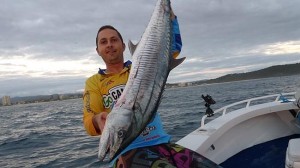While U.S. National Public Radio was hyping the possibility of men ingesting ciguatera toxin from grouper and then passing the toxin to their partners via sperm in a lame, 25-year-old Valentine’s Day tie-in, the real thing is going on in the Gold Coast, southeast of Brisbane.
Hundreds of boats have been flocking to the Gold Coast’s offshore reefs with many reeling in bumper catches of Spanish mackerel in  recent weeks.
recent weeks.
But now fishermen are being warned to throw back their biggest catch after doctors diagnosed four people with ciguatera poisoning after they ate a large 12-15kg Spanish mackerel caught on the Gold Coast last week.
Burleigh Waters man Noel Brindley and his wife Merridy enjoyed pan-fried fillets of fresh mackerel hand-caught by their son but were soon in agony suffering gastro-like symptoms, fainting, extreme itchiness and burning sensations from cold water.
“We have been eating locally caught mackerel for 13 years without a problem,” he said. “This took us by surprise and we have never been so sick in our entire lives.”
“I wouldn’t wish this on my worst enemy.”
The Brindleys and two others who ate from the same fish were diagnosed with ciguatera poisoning — a toxin found in warm ocean reef algae which is eaten by fish that in turn are eaten by larger predatory fish.
The poison is more commonly found in apex predator fish species including Spanish mackerel, reef cod, coral trout and red bass in more tropical waters such as those off North Queensland and Fiji.
Gold Coast poisoning cases are considered rare.
Queensland Health guidelines warn anglers to throw back anything over 6kg and to avoid eating the head, roe, liver or other internal organs where the toxin are concentrated.
There is no quick fix for sufferers and symptoms can be known to recur for months.
Mr Brindley said his bout of sickness gave him new empathy for mother and daughter Noelene and Yvana Bischoff who died in Bali last month from scromboid fish poisoning which has similar symptoms.
Ciguatera is produced by a single-celled protozoan that sticks to algae on tropical reefs. It then moves up the food chain and eventually accumulates in large, predator fish.
